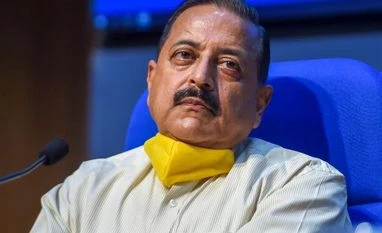Union minister Jitendra Singh on Tuesday called for collaboration between India and the UK on issues of mutual concern such as achieving the goals of food security and zero hunger.
Addressing a joint India-UK meet on 'Sustaining Food Production under Environmental Stress' through virtual mode, Singh said the two countries must invite global collaborations in various dimensions of science like agriculture, medicine, food, pharma, engineering or defense.
The workshop is being organised jointly by National Agri-Food Biotechnology Institute (NABI), Mohali, an institute under the Department of Biotechnology, University of Birmingham in the UK and supported by Newton Bhabha Fund and British Council.
He called for collaboration between the two nations on issues of mutual concern like achieving the goals of food security and zero hunger.
He said India's efforts to safeguard the food security needs of every citizen in the country have been unprecedented as Prime Minister Narendra Modi even ensured that no person goes hungry during the pandemic time.
Moreover, policies have been framed to protect interests of small and marginal farmers, and conserve local food cultures which in turn will significantly contribute to food security, the minister added.
More From This Section
Singh said India-UK joint collaboration may include programmes like students exchange, basic research, technology development, product development as well as product/process demonstration and their implementation in joint collaboration.
The minister said the COVID-19 pandemic demonstrated that science is the only major key tool to find solutions and to give solutions for tough times to be faced by the mankind.
He pointed out that Indian science has proved the capability to produce vaccines for such a high risk/devastating disease in a very limited time and added, "We should not restrict our ideas to Indian perspectives, rather there should have a global horizon."
Dwelling on the issue of sustainable food production, Singh said the South Asian region is facing the shrinking arable land, besides the problem of global climate change that needs to be addressed.
Quoting World Bank data, the minister pointed out that arable land in South Asia was reported at 43.18 per cent in 2018 which has been stagnant since the early 1970s and recently declining.
He said growth in yields and more intensive use of land will account for all of the growth in crop production and will also compensate for losses in the arable land area.
Underlining that the global pattern of food production and distribution may need to shift significantly as climate change progresses, Singh called for joint funding to develop a coherent and stakeholder-relevant R&D programme that will address this challenge.
He said the initiative by the British Council to support such interactive meet among the researchers with a common goal will draw attention from stakeholders and nurture young investigators to provide them with an excellent platform to share and rear the ideas.
)